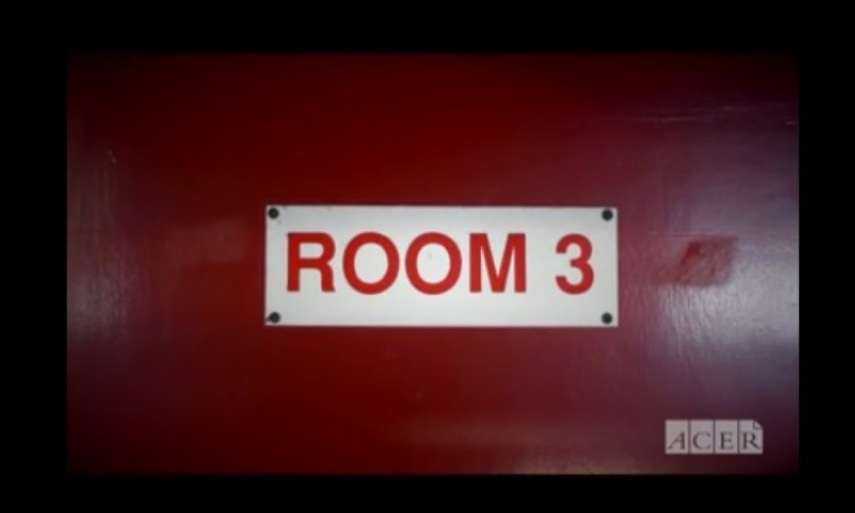Once a fortnight the Teacher team ventures down to Room 3 – the basement archives at the Australian Council for Educational Research – to bring you education quotes from some of our favourite historical titles.
Room 3 is home to a plethora of texts originating from way back when. Each fortnight we bring you choice titbits from some of our favourite historical titles via Facebook and Twitter.
Board of Education (1944). Teachers and Youth Leaders. H.M. Stationary Office: London.
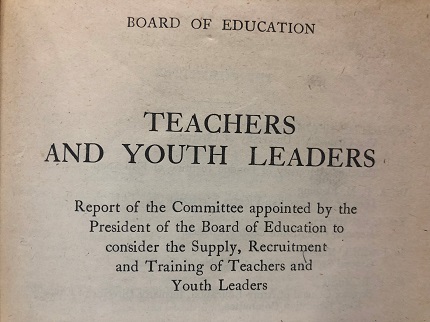
‘We must ensure that those who intend to be teachers … enjoy a period of education [to] encourage them to live a full life themselves so that they may contribute to the young something which arises as much from a varied personal experience as from professional studies.' (1944)
‘The nature of school buildings and the size of classes can make or mar the satisfaction that teachers find in their work. They affect their efficiency and comfort.' (1944)
‘There are many teachers who need, and many others who naturally desire, an opportunity of bringing their knowledge or skill up to date or of investigating educational practice in schools other than their own.' (1944)
‘It is a truism to say that every teacher, in however humble a capacity he or she may be serving, is directly and vocationally involved in moulding the shape of things to come.' (1944)
‘The steadily accumulating results of research should serve to ensure the progressive enrichment and adaptation of training courses and so avert the ever present danger of the uninspiring repetitive routine.' (1944)
‘For young children, the work of their hands is a way of expressing what is in their minds and imaginations. It is another language.' (1944)
‘[Education] should cover the study and the observation of the physical growth and development of children and their need for giving constructive and creative expression to what they experience, feel and think.' (1944)
‘Teachers should, within reason, freely be granted facilities for attending meetings of scientific and learned societies, and for paying frequent visits to works and commercial undertakings to observe what is being done and to make the necessary personal contacts.' (1944)
‘Teachers of technical and commercial subjects should periodically spend some time away from teaching and in close contact with industry.' (1944)
Browning, O. (1891). An Introduction to the History of Educational Theories. E.L. Kellog & Co: New York and Chicago.
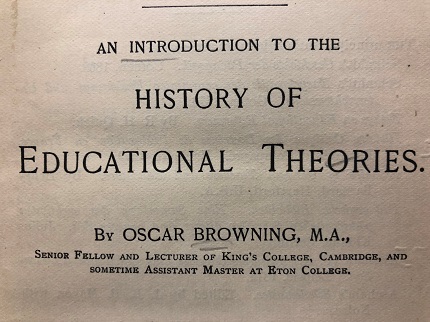
‘The truth of education resides not in the mechanical perfection of study and routine, but in the spirit of the teacher working in the heart of the pupil.' (1891)
‘It has occurred to many that, if to the whole curriculum of science there could be added a curriculum of practice, few pupils would be found incapable.' (1891)
‘In teaching children we should try gradually to join together “know and can,” knowledge with practical power.' (1891)
‘All teaching to be effective must set the mind of the learner in independent motion.' (1891)
‘The one essential condition to the acquisition of wider knowledge is a desire of learning in the pupil.' (1891)
‘Each pupil requires that special kind of stimulus which is best suited to his disposition. Work should alternate with play.' (1891)
‘Play was the natural way in which a child educated himself … the spontaneity of play is a great mainspring; the processes of education must be founded on the principles that underlie play.' (1891)
‘Although the educator cannot effect all that he wishes he must set his level of aspiration as high as possible.' (1891)
‘Education is an art which must be brought to perfection by the practice of many generations. Each generation can profit by the experience of its predecessors.' (1891)
Scheffler, I. (1960). The Language of Education. Clarles C Thomas: USA
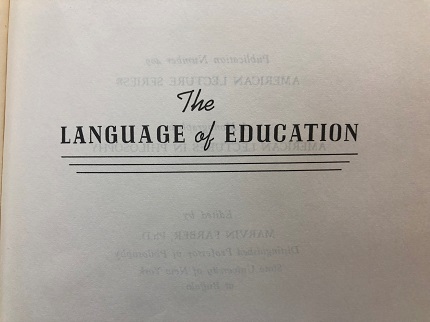
‘Ought the school's responsibility to embrace the individual social and psychological development of its pupils?' (1960)
‘Education, like art, literature, and other phases of social life, has changing styles and problems in response to changing conditions.' (1960)
‘… the fundamental meaning of the concept of education is to help boys and girls to achieve active participation in the world around them.' (1960)
‘It is, indeed, true that the way in which we organize our educational efforts and operate our schools is conditioned by prevalent definitions of human nature.' (1960)
‘To have been successful in teaching implies no more than that students have learned in relevant ways, not that they have become masters.' (1960)
‘It is mistaken to think that one may learn to teach by mastering some distinctive pattern of movements, or that we can teach people to teach by prescribing such a pattern for them, formulated in general rules.' (1960)
‘We may, if we like, call teaching a ‘practical art' in that it is an activity, aimed at a goal that defines success, and improvable by rules that do not, however, guarantee success.' (1960)
‘There needs, of course, also to be a relation of mutual and sympathetic interest between teachers and educational researchers.' (1960)
‘Improving the practical art of teaching through provision of appropriate rules is one main task of educational research.' (1960)
‘Teaching involves the treatment of such topics as the nature of educational rules, the relation of scientific research to schooling, the development of moral conduct, and the clarification of curricular discussion.' (1960)
Judges, A.V. (1959) The Function of Teaching. Faber and Faber Limited: London.
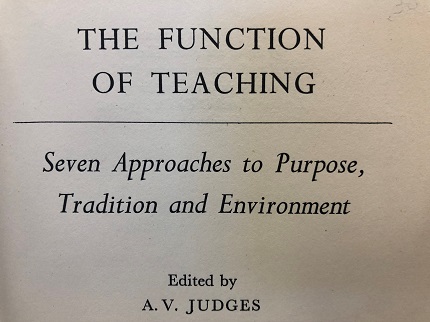
‘Most of us would say that we wished to give every child a chance to develop his talents to the full whatever his social background.' (1959)
‘Many of us would go on to say that one of the primary purposes of education … is to make children develop into better citizens of a democratic community.' (1959)
‘Most of us share in this belief that education can and does make individuals and societies better. That is why we go on attempting to educate.' (1959)
‘There can be very few people here who would not welcome the raising of the school-leaving age to sixteen or the creation of county colleges. Why? Because we believe that such extensions of education will make people better.' (1959)
‘As we walk into our classrooms and our lecture rooms … we believe that we are creating a new world.' (1959)
‘Good teachers and the great books that are put into their hands are enabled to transcend the backgrounds from which [students] spring.' (1959)
‘We must face more frankly than we often do the responsibility that rests on our schools and colleges and universities to supply influences that the homes of many of our pupils do not provide.' (1959)
‘To the question “what is the purpose of education?” we know that there can be no simple answer, for there are many purposes.' (1959)
‘It would be a pity if we overlooked the possibilities of education as a means of acquiring wisdom: if we belittled the acquisition of knowledge for the satisfaction of curiosity, without any further motive than the desire to know; and if we lost our respect for learning.' (1959)
‘It must be the right education, an education, that is to say, that teaches people not simply to live but to live well.' (1959)
Bostock, J., Hill, E. (1946). The Pre-school child and society. Shipping Newspapers (Queensland) Ltd. Brisbane.
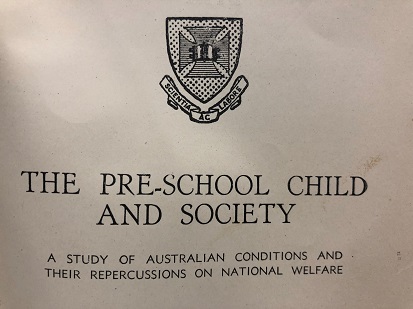
‘Observations made upon the emotional behaviour, the mental development and social adjustment of the children are used to guide both staff and parents in the handling of everyday behaviour problems.' (1946)
‘Each of the three [kindergarten] playrooms is designed for a particular age group. They are colourful, cheerful and attractive, and the children are constantly under the inconspicuous supervision of nursery-kindergarten teachers.' (1946)
‘There should be one playroom for each age group. Colour schemes should be selected with due regard to the need for adequate lighting and a restful atmosphere. In general pastel shades are favoured.' (1946)
‘In essence the pre-school centre must be the nucleus about which a much wider development of the community centre idea will evolve.' (1946)
‘There can be no rigid formula for a pre-school child centre, and it would be extremely unwise to attempt to make all kindergartens conform to any one pattern.' (1946)
‘There should be sufficient space indoors and outdoors, to allow children to carry on the activities suitable to their stages of development in all types of weather, without being in each other's way or being constantly forced into groups.' (1946)
‘Children's equipment should be safe, easily accessible and designed to meet the needs at each stage of development … equipment should include materials which allow for muscle development and creative activities.' (1946)
‘The children themselves are the avenues through which the most essential knowledge must come.' (1946)
‘Music, particularly singing, playing and listening in groups is undoubtedly conducive to good citizenship and should be cultivated in the early years. All Australian kindergartens recognise the value of music for the pre-school child.' (1946)
Association for Education in Citizenship. (1935). Education for Citizenship in Secondary Schools. Oxford University Press; H. Milford.
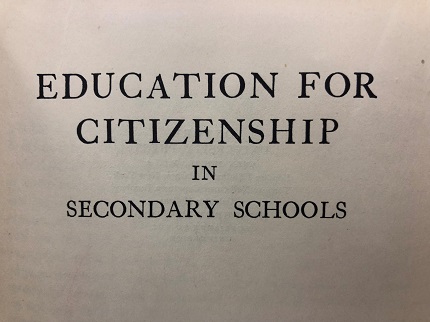
‘The conditions in which we live to-day and the problems that confront us call for a fresh emphasis in the work of education on the social and civic responsibilities.' (1935)
‘His education should make him feel himself to be consciously at one with the community, sharing in its traditions of the past, its life and action in the present, and its aspirations and responsibilities for the future.' (1935)
‘Unfortunately a large proportion of our education is still completely detached from the problems of the modern world.' (1935)
‘It is easy to teach students to reason correctly in the physical sciences: it is much more difficult to teach them to reason correctly in the social sciences where their own prejudices and passions are involved.' (1935)
‘[Students] must be taught habits of clear thinking in order that they may acquire the power of recognising their own prejudices.' (1935)
‘In many quarters, even to the present day, ‘art' in schools has been relegated to the position of a minor or extra subject.' (1935)
‘But it is only during adolescence that a conscious grasp of art, in its general bearings, becomes possible. And this is the stage at which we usually neglect our opportunities, under pressure of other things.' (1935)
‘It is a great asset if the modern language teacher can have his own room, and in it create the atmosphere of a little corner of the foreign country.' (1935)
‘What we need urgently is a new standpoint, invading every classroom and every subject, reinterpreting art as an indispensable element.' (1935)
‘If we are trying to teach our pupils how to think and to express their thoughts, it is essential to remember always that we are trying to teach them to think for themselves.' (1935)
